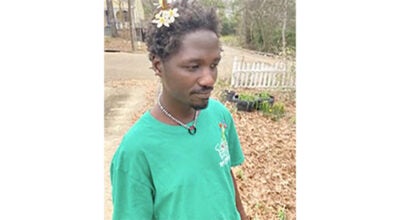Man walks out of jail cell Thursday after spending 17 years behind bars for crime he didn’t commit
Published 5:07 pm Thursday, June 27, 2019
A man who spent 17 years behind bars for a 2001 armed robbery in suburban New Orleans walked out of jail and into the arms of sobbing family members Thursday, exonerated by fingerprint evidence that linked the crime to another man.
“I don’t know what to say,” a tearful Royal Clark Jr., said after being greeted by a small army of family and well-wishers, including his mother and son, Royal Clark III, who was born the year his father was arrested.
Clark turned 41 on Wednesday.
“It’s the last birthday he will spend in prison,” a smiling Kia Hall Hayes, attorney for the advocacy group Innocence Project New Orleans, declared in court Thursday. Her organization had secured Clark’s freedom.
Assistant District Attorney Terry Boudreaux wished Clark well and guards escorted the former prisoner — still shackled and wearing orange prison garb — quietly past his father, mother and other family members.
Less than two hours later, dressed in street clothes, he strolled out of the dimly lit lobby of the Jefferson Parish jail and into the blazing sunlight, to the applause of supporters.
Clark was arrested and jailed in 2002 and convicted the following year, on his 25th birthday, in connection with the robbery of a fast food restaurant in 2001. He told reporters Thursday that there were times he had given up hope that he would ever win his freedom from a 49-year sentence.
“I’m not going to sit here and lie and tell you I didn’t,” he said. But he said he refused to be angry about the injustice. “I can’t let anger direct me,” he said. “I can’t let my past be my future.”
Clark repeatedly thanked God, his family and lawyers for Innocence Project New Orleans.
Royal Clark III, 17, struggled to hold back tears as he tried to talk about the absence of his father in his life. “My mama couldn’t always be there for me. She had to work,” he said, his father’s arm draped over his shoulder. Tears streamed down the father’s face. “He was supposed to be there to teach me.”
State District Judge Donald Rowan Jr. formally vacated Clark’s conviction, based on a reexamination of fingerprint evidence. The office of District Attorney Paul Connick joined Innocence Project New Orleans in asking the Jefferson Parish Sheriff’s Office to reexamine the evidence using new technology, Connick said in a statement. The prints were compared to those in a state database and were linked to another suspect who had been convicted in a series of later robberies.
“As district attorney, my obligation to seek justice does not end upon conviction,” Connick’s statement said. “When the evidence reveals an individual was wrongfully convicted my office will take action to correct that injustice.”
Hayes and Innocence Project attorney Emily Maw said the case also demonstrates the unreliability of eyewitness evidence. Clark’s conviction was the result of a misidentification by a single eyewitness, a restaurant employee, nearly two months after the crime. The eyewitness admitted that her attention had been focused not on the perpetrator’s face but on his gun, the Innocence Project said in a news release.
A jury voted 10-2 to convict Clark in 2003. Louisiana voters recently approved a measure requiring unanimous verdicts in criminal cases.






